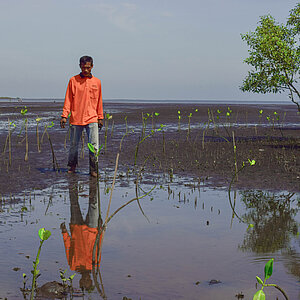Ambitious climate policy

On the basis of nationally determined contributions (NDCs) to date, emissions are predicted to continue rising until 2030 and long-term global heating of approximately 3 degrees Celsius is also expected. When the Paris Agreement was signed in 2015, it was already known that the nationally determined contributions (NDCs) in place at the time were not generally adequate for maintaining the upper limit to heating set out in the Agreement. Accordingly, the signatory countries agreed in Paris to review their NDCs regularly every five years, so as to identify options for improvement and optimisation (i.e. make them more ambitious), to submit information, and to update or restate their pledges. The first review became due in 2020.
Two years before each review, a comprehensive review of global progress made towards the goals of the Paris Agreement is envisaged. This ‘global stocktake’ is intended to help the parties identify whether they are generally on the right path as regards climate change mitigation, adaptation to climate change and the financing of climate mitigation measures. In this way, the results of the stocktake provide orientation for updating the NDCs.
In addition, the countries were also invited to submit their long-term strategies (LTS) by 2020. The development and implementation of these LTS has a decisive role to play in the transition to a carbon-neutral future, accompanied by sustainable economic growth that is in harmony with the goals of the Paris Agreement. Alongside Germany, the EU and other nations such as China, Japan or South Korea, IKI partner countries such as Chile, Argentina or Costa Rica have already adopted corresponding carbon-neutral goals.
IKI support for partner countries
The IKI provides support to partner countries in bilateral and various multilateral projects in developing and raising the ambition levels of their NDCs and LTS.
One instrument for implementing LTS and NDCs in developing and emerging countries is the use of nationally appropriate mitigation actions (NAMAs): these are voluntary sectoral measures that take the form of projects, programmes and policies, and are implemented as part of the Mitigation Action Facility. Another important element is the transposition of LTS and NDCs into sectoral policies and implementation measures, such as incentive mechanisms at national and subnational level, for example, which are supported by the IKI’s work.
The IKI uses all of these approaches to support ambitious global climate change mitigation.
Systematic auditing of climate change mitigation measures
Scientific research forms the informational basis for the global stocktake, especially the most recent reports published by the IPCC as well as summaries of national reports. To ensure compatibility between national reporting standards, the UN Climate Summit held in Katowice (COP24) in December 2018 adopted a transparency framework, known as the Enhanced Transparency Framework (ETF), that was binding on all countries as part of the Paris Agreement. The necessary rules and specifications were agreed as part of a comprehensive regulatory scheme for implementing the Paris Agreement.
This ‘rulebook’ contains clear instructions about how signatory countries should report their greenhouse gas emissions and mitigation measures, as well as the information to be included with their NDCs. All of this is intended to help countries worldwide report on national activities according to the same standards by 2024 at the latest. These rules will then be binding on efforts to raise the ambition levels of NDCs in 2025. The new transparency system also aims to enable monitoring of NDC commitments and self-defined climate change mitigation goals, and so strengthen the impact of the Paris Agreement and its implementation.
The IKI projects focusing on MRV (measurement, reporting and verification)/transparency are generally intended to help partner countries establish national MRV and transparency systems. These projects work on building local institutional, technical and financial capacities. The International Partnership on Mitigation and MRV was launched in 2010. Now renamed the Partnership on Transparency in the Paris Agreement (PATPA), it supports practical knowledge transfer and political dialogue about climate transparency. These formats are also of particular importance because they indirectly contribute to the establishment of mutual trust and raising ambition levels in partner countries.
Approaches to socially equitable and environmentally friendly business
Green Economy approaches not only account for human well-being and social justice but simultaneously aim to minimise the impact on the environment. By keeping ecological limits in mind, the idea is to enable growth that is environmentally compatible and therefore sustainable. As a concept, the inclusive and sustainable economic approaches adopted by the ‘Inclusive Green Economy’ (IGE) unite the goals of Agenda 2030 (SDGs) with the NDCs.
The path towards an Inclusive Green Economy leads through a transformative process that encompasses changes in economic models and lifestyles. Green growth enables sustainable and ecologically viable economic growth and innovation. Key factors involved in environmentally compatible business include reductions to emissions, improvements to energy and raw material productivity as well as the sustainable design of products, supply systems and infrastructure. There is therefore a direct interrelationship between green jobs, product life cycles and green financing models. Accordingly, many IKI projects provide support to partner countries in their efforts to align their financial system with the needs of green growth.
Selected projects
- NDC Support Programme
- Green Economy Transformation in Cooperation with the Partnership for Action on Green Economy (PAGE) – Synergies between…
- Initiative for Climate Action Transparency
- Support Project for the Implementation of the Paris Agreement (SPA)
- Support for SDG Review and Implementation Processes (SDG-RI)
Further information
Videos on this topic
The link has been copied to the clipboard












